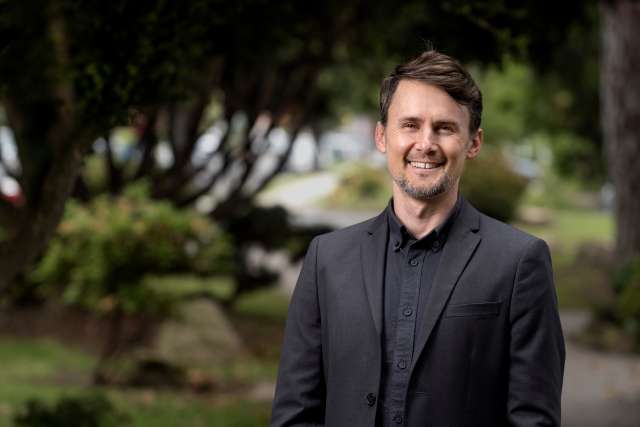Greg Flaxman, LCSW, started practicing mindfulness in 2007 as an undergraduate student at UC Berkeley. By the time he came to UCLA for graduate school a few years later, he was leading mindfulness sessions for classmates.
“I was learning about the research about meditation and it was just kind of blowing my mind that this was not more mainstream,” Flaxman says. “Now we have apps and even commercials for it but back then, there was still a lot of new science coming out that was really affirming the benefits of it.”
Those scientific findings motivated him to start meditating. And once he saw the positive impact mindfulness practice was having on his life, he was inspired to share it with others.
Now, among his other duties as a clinical oncology social worker at the Simms/Mann-UCLA Center for Integrative Oncology, Flaxman leads a mindfulness meditation group for people with cancer.
Mindfulness is the practice of intentionally paying attention to moment-to-moment experiences as they arise, with curiosity and without judgment. This cultivates a sense of ease and balance, allowing for thoughtful response rather than automatic reaction to life circumstances.
Coping with cancer
Mindfulness practice “allows people to be able to stay with an experience that is already there, that’s already present for them,” Flaxman says. “So if there is something challenging going on, perhaps because of the cancer — like pain, or emotional distress, anxiety, sadness — what I’ve seen is that it allows folks to be able to be with that in a way that brings in some self-compassion.”
Once people develop some familiarity with mindfulness practice, they can call upon that feeling of groundedness at will, he says. Someone going into treatment, for example, might tune into their breath, the sensation of hearing the sounds around them, or anything that feels neutral or calming. Mindfulness meditation builds the ability to find an internal anchor, he says.
Flaxman also continues his personal mindfulness practice as a way of staying present with his own emotional landscape.
“I like thinking of it as a form of mental hygiene,” he says.
As a social worker with the Simms/Mann Center, Flaxman also sees individual patients of all ages at any stage of their cancer journey.
Receiving a cancer diagnosis brings about a range emotions for many people, including anxiety, depression and shock, Flaxman says. At the Simms/Mann Center, which provides psychosocial care for people with cancer and their families, coping with the psychological and emotional challenges of the diagnosis is as essential as any other medical treatment.
“Some people don’t even have an emotional response in the moment because they’re so focused on the treatment and so focused on just taking the next step,” Flaxman says, adding that he sometimes accompanies his patients to their chemotherapy appointments or doctor visits to offer support.
Desire to help
Flaxman says he knew from a young age that he “wanted to be in a helping profession.” He was close to his grandparents when he was growing up and saw the challenges they faced as they got older. He was moved by the care a hospice worker provided their family at the end of his grandparents’ lives.
“Being on the other side of the support that was needed and seeing what could be valuable and beneficial to people — I wanted to be part of that solution,” he says. “There’s something that feels good about being able to give back in this way. It feels like a way of honoring their memories.”
Flaxman was drawn to the Simms/Mann Center because of its integrative approach to treating cancer, beyond the traditional medical model. Besides mindfulness, its offerings include art therapy, qi gong, breathwork and chaplains who provide spiritual support.
“It’s really looking at caring for the entire person: mind, body and spirit,” he says. “To be part of a team that has all these different specialties — that really can be such a support to people and allow them to find their home, in a way. I feel like the Simms/Mann Center creates a place for people where they feel a sense of belonging and community.”




